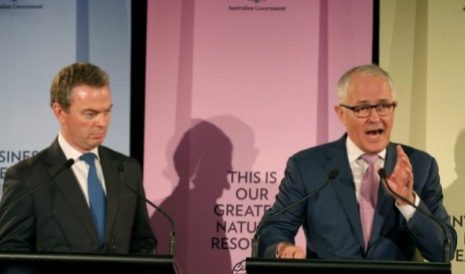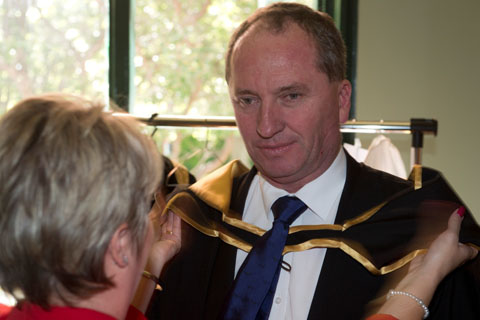Turnbull’s Innovation – a rebranding of the same old pocketful of promises

Malcolm Turnbull’s ‘Innovation! Package‘, turns out to be another boost to small business and nothing to do with innovation at all. It is another conjuring trick from a government pledged to avoid commitment or accountability under the guise of ‘encouraging the free flow of ideas and entrepreneurs’. It is based on a seriously defective business model, the tech start-up. As a strategy toward economic restructure, it is a poor choice; an inexcusable error of judgement.
Above all, Innovation! is an opportunity missed. Instead of investing in renewables, boosting employment and kicking its fossil fuel dependency, the Coalition has chosen the trendy but flaky tech start-up business enterprise, a choice which will distract from tackling its rising carbon emissions while further trashing Australia’s former reputation as a good global citizen.
For all Greg Hunt’s absurd claims that we lead the world in climate policy, expert report, based on a range of measures, from the UN climate talks in Paris yesterday reveal us to be third last. Although Julie Bishop may fluff around on the world stage promising to fix climate with ‘innovation’ the truth is that we are substituting urban myth for science or economics.
The start-up myth itself is enchanting and beguiling. Rich young San Francisco Bay Area, California dudes meet somewhere on the autism spectrum and hunker down to a year or two of nerdy anti-social existence. They live off their wealthy parents while they code software 24/7. Overnight they become billionaire misfits and eccentric publicity-loving celebrities proving all along to the world that smarts matter. The PM, especially, loves this tale.
The dudes attract a few other couch surfers along the way together with a rash of venture capital: rich folk who gamble by lending the dudes money in the hope of a huge return on their investment. Or not. Stop the press.
The start-up success story is an urban myth. Surely no-one in their right mind would recommend we adopt this model to fix our own tanking economy? If he is serious about the Innovation! hoo-ha, Mal’s judgement is once again is up the Silicon Valley creek.
Start-ups are expensive failures as a rule. Current UC Stanford and Berkeley research shows that over 90% of start-ups self-destruct. Typically, software dudes borrow to build a product for which there is no customer, a product for which they also have to manufacture a demand. Nothing like putting on the wings when your craft is taxiing along the runway. When the product is ready to market, the dudes have no buyers, no income and no funds to continue and they crash. The dudes fall back on couch-surfing until they inherit.
Not all give up. There are serial starters-up who make failure a lifestyle choice. Our PM warms to these. He will see to it that failure is elevated in our own society to the status it deserves by taking the sting out of bankruptcy. No stranger to failure himself, politically, he will ignore the difference between political and business failure. Taxpayers will pick up the tab.
Even the few start-ups who succeed, employ few workers and minimise their taxes. Outfits like Google or Apple or Facebook are adept in creative tax accountancy. What start-ups are good at is making profits for investors.
Making a few rich dudes richer is no way to rebuild a nation’s prosperity. Start-ups offer no key to economic revival. They do, however, offer an attractive package to business classes, a package which is trendy enough to deceive the mug punter who will pay the bill through higher taxes. And coal is spared by default.
Strip away the packaging and Innovation! looks like plain old crony capitalism; a rebranding of the same old pocketful of promises to the big end of town that is the Liberal Party’s reason for being. A bit of tinkering around the edges is added to confirm Innovation!. Some refunds are touted as reinvesting in science as if government has suddenly come to its senses after destroying the CSIRO’s morale and much else with it. Turnbull supporters seize on the refunds as proof that Mal is progressive after all. The facts attest otherwise.
Some ‘efficiency dividend’ cuts from CSIRO, made when ‘good government’ had no need of science, will be returned. But it is nowhere near enough funding to do a ‘reset’ even if CSIRO wanted to. Or it were possible. So much knowledge has already been irrevocably lost. But business and science will be able to hold hands in the cosy, innovative Turnbull era instead of being at arm’s length or independent as empirical impartiality dictates.
Academics are to be enticed out of ivory towers to team up with business types in an alarming re-run of the wishful thinking that ignores our economy’s small size. We do not have the money. Venture capital is just not available here to the degree that it is to UK or US researchers. The priceless value of pure research in non-commercial fields is also ignored, although vital to innovation and the foundation of all science.
So what are we left with? Another tax break for investors? A newer, softer neo-liberal bankruptcy-lite to allow ‘entrepreneurs’ to quit more easily; bail out of financial obligations such as wages to redundant workers more readily? An incubator for shonky con-men and dud business ideas? Strip away Innovation! Package wrapping and most of what is left amounts to a scheme in which privileged venture capitalists are subsidised by everyone else.
Attracting venture capital, we are told by our po-faced ring master Turnbull will enable the best business brains to invent new businesses which in turn will G-R-O-W the economy. We are to forget in all the hoopla and excitement that venture capital has no interest in progress or innovation as such. But it loves huge profits.
Turnbull expects us to fall in love with a scheme to encourage those whose business model includes the very best the Cayman Islands has to offer. It will not build a 21st Century economy or a nation but it will accelerate our already disturbingly rapid divergence into two distinct nations, a nation of haves and have-nots.
Yet is anyone really surprised by Turnbull and Pyne’s surprise package? Turnbull gave us our NBN, popularly known as ‘fraudband’. A political stunt, NBN is now woefully behind schedule, over-budget, slow and over-priced. It is increasingly evident to consumers that the NBN project, like Direct Action is fundamentally flawed.
Substituting copper wire for fibre allowed the LNP to undercut Labor’s real NBN, but it is a bit like carrying forward Kyoto credits instead of reducing our carbon emissions, an accountancy trick which does nothing to make it all work. A sale of Turnbull’s NBN lemon is rumoured. In softening bankruptcy rules, Monday’s message is that it’s OK to fail. You learn from it. Turnbull would know. Or is it OK to fail, provided someone else picks up the tab?
A Humpty Dumpty for our times, Turnbull can make Innovation! TM mean whatever he chooses as he peddles a scheme to boost his wealthy backers’ fortunes at the expense of all the rest of us; a type of subsidy for the investing classes. Treasurer Morrison is on standby to announce further cuts in government spending; cuts to our services and quality of life as a nation, all in the name of Innovation! Innovation! is already morphing into a new, secular religion, at least in Liberal Party circles. Or is it a tax-deductible church and charity to business? What is certain is that it will cost us all dearly.
Innovation promises, programmes are old hat in Australia. Innovation policy expert Roy Green notes that Australia has had 60 reports at Commonwealth level on innovation since 2000. $9.7billion of government funds is spent annually on ‘research and innovation’ across 13 portfolios and 150 budget line items.
Making Innovation! into a faith means that it is immune from criticism. You can’t be against the future can you? Only a heretic would be sceptical. Challenging the creed is almost un-Australian, as Malcolm Turnbull clearly implied when he chided Leigh Sales on Monday’s 7:30 Report. ‘Aunty is not interested in Innovation!?’ he gibed. Nor was she excited. ‘Exciting’ infects all government policy announcements it seems. It is becoming a test of faith. Forget reason. If you are not excited, you are beyond the pale; an unbeliever and a Luddite.
Turnbull’s ‘exciting’ announcement on his nation’s future is pure theatre. Spruiking his package around lunch time Monday, the PM is flanked by our agile new Innovation! Minister, Christopher Pyne, the consummate political organ grinder’s monkey who is reinventing – repositioning himself – ‘in this space’ – before our very eyes. Pyne is flattered, he says, to reveal that his name was called second when Turnbull announced his new cabinet, but to others the PM’s choice of Christopher Pyne for the new portfolio signals an each-way bet at least on its success.
A spectacular flop as a ‘back to the future’ Education Minister, whose advisors included back to basics gurus, Kevin Donnelly and other advocates for corporal punishment and that old nostrum ‘the Judaeo-Christian tradition’ to purge the modern filth of relevance from children’s learning, Pyne peddled his ideologically blinkered, backward vision of education as a private market-driven commodity and the rightful prerogative of the rich.
Although the odd, ambitious, Vice Chancellor could see promotion in embracing Pyne’s elitist neo-liberal plan to privatise learning, there were few other takers. It was widely believed that Pyne was forced to write a book, about himself for his children lest they read for themselves, one day, unaided the truth about their father’s failures. Yet he is a survivor. A sequel, Christopher Pyne, A Man for All Seasons, must surely follow.
Disappointingly missing from the launch of the new era of mindless optimism, Australia’s own techno-Micawberism was a song and dance routine. Surely Kylie could be persuaded to reprise Locomotion with just one or two judicious edits?
‘Everyone is doing it … the Innovation! … c’mon … c’mon … do the Innovation! with me’.
Another Prime Minister, another Christopher Pyne is doubtless already working on the choreography. ‘Industry, Innovation! and science’ are conjoined uneasily in a threesome of convenience in the tyro minister’s full title but we all know it’s a meaningless title for a made up job to keep a recycled Pyne, a numbers man, in Turnbull’s pocket in case another coup is brewing.
Abbott will stay in politics by popular demand, he says, between snipes at his PM and his PM”s policies. Yet Mr Popularity brushes aside his need to discipline rogues. Even with the recent eight point downturn, he’s still up in the ego polls of preferred PM, as if it matters.
Turnbull is mobbed by his own cheer squad. Kate Carnell just loves him. Andrew Carnegie has a man crush. Orchestrated squeals of approval are heard from the hordes of ‘institutes’ and other ubiquitous lobby groups for the rich which will successfully block any real progress or innovation. Indeed, Australians have stagnation rather than innovation to look forward to in the words of the clear-eyed economist Satyajit Das.
‘What I’m seeing now in Australia is the same that I see in many Western democracies. Powerful lobby groups form and then they basically push their own agendas and, because they countervail each other, the whole system basically gets completely and totally stagnant and nothing happens.’
Turnbull’s Innovation! stimulus package unleashes a Pavlovian stampede as business classes clamour and elbow each other aside to snout the public trough, breaking only to preach small government or plead with government to cut funds from the poor and disadvantaged. An intoxicating scent of vast profits to be made wafts towards the feral animal spirits of the entrepreneurial classes like catnip from Canberra. This way if you want to make money!
Anyone who has any can lend their money at favourable rates and with less risk to ‘start-ups’ or new businesses. Rich white men step up. They are not slow to catch on to Malcolm’s spiel. Business, especially ‘small business’ as the motley, multifarious mob likes to style itself, can see that Innovation! is all about encouraging ‘start-ups’ or small business ventures. About them. And that’s all it is. Innovation! is not about new or original ideas. The country can’t afford any of that expensive, non-productive nonsense.
Kill-joy Opposition Leader, Bill Shorten, is duty-bound to remind anyone still listening to him that, ‘Since the 2013 election, the Abbott-Turnbull Government has cut $3 billion from innovation, science and research initiatives.’ Let Malcolm Turnbull insist at every turn that we are an agile and clever country, the evidence is otherwise.
Australia may rank number one in the world for how many years kids typically spend at school, but it is 77th when it comes to how many graduate with science and engineering degrees. Here Australia ranks below Azerbaijan, Mongolia and Guatemala and will continue to do so provided our innovation is confined to creating business incubators for the wealthy at the expense of expanded, improved access for all to education.
Let Turnbull make his announcement with the assistance of a funky horn-rimmed Pyne now reborn as guru of the Innovation! vibe. Well may they redeem bankruptcy and failure as yet another stage in learning. Pyne is destined to fail at his latest project just as surely as he flopped as Minister for Education. Unless, of course, he incurs collateral damage as Mal Brough digs himself out of the Ashby go-fetch-Slipper’s-diary scandal.
Australians are not deceived. They know that Prime Ministers and governments do not create innovative nations or economies by decree. They know that however attractive the tax breaks, a rash of investment in companies based on the software start-up model is no more a step towards greater national prosperity than it is a way to restructure our stalled economy.
Designed to reward his small business backers, presented as something it is clearly not, infected by the mania of the Silicon Valley start-up cult and heeding none of its limitations, Turnbull’s Innovation! Package is a breach of faith with the Australian people as much as a signal failure of his government’s political imagination and will to explore real reform. Still, with Kylie behind it, The Innovation! could really catch on.
‘Everyone is doing it … the Innovation! … c’mon … c’mon … do the Innovation! with me’.
Like what we do at The AIMN?
You’ll like it even more knowing that your donation will help us to keep up the good fight.
Chuck in a few bucks and see just how far it goes!
Your contribution to help with the running costs of this site will be gratefully accepted.
You can donate through PayPal or credit card via the button below, or donate via bank transfer: BSB: 062500; A/c no: 10495969












